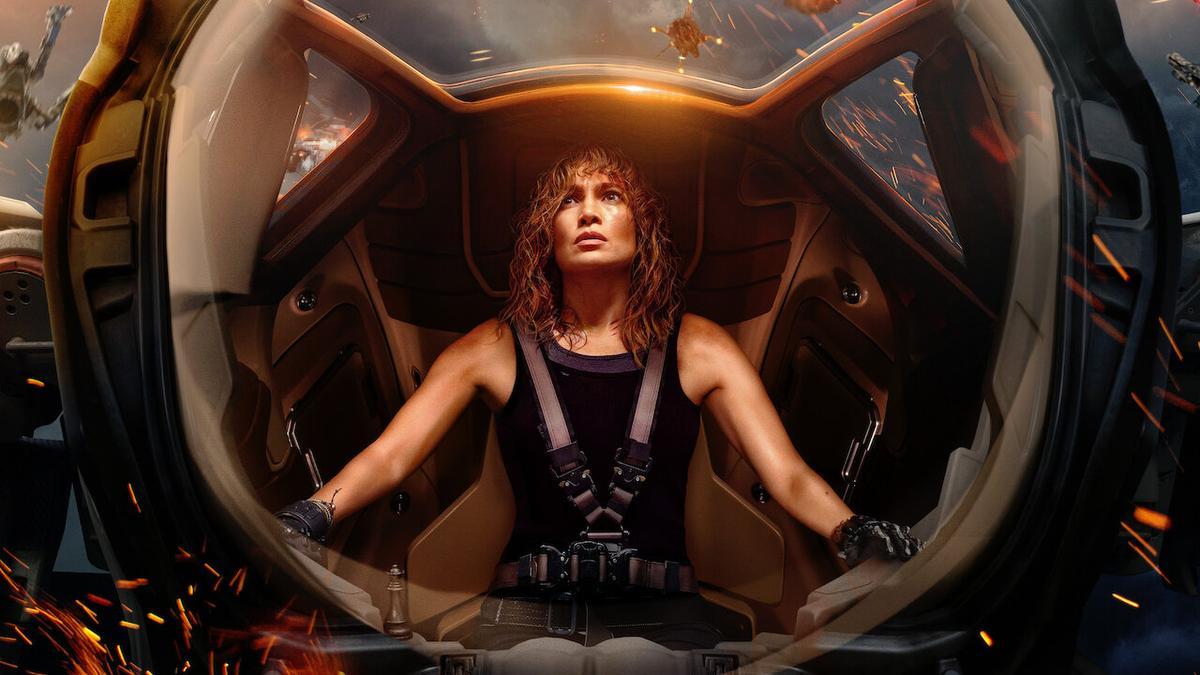
Just when viewers crave mindless pyrotechnics on screen, the universe—via Netflix—answers with “Atlas.” Directed by Brad Peyton, who previously entertained us with “San Andreas” and “Rampage,” this sci-fi actioner plunges into the future, questioning whether AI has a soul hidden within its billion lines of code. However, at its core, “Atlas” aims to have fun blowing things up, and it does so in a jolly spectacular style.
Set in a futuristic world, the movie explores a scenario where AI becomes self-aware and, led by Harlan (Simu Liu), turns against human beings. Several attacks ensue, including one on Bengaluru that results in “over 500,000 killed” in AI-controlled drone strikes. Following these catastrophic events, Harlan flees to a distant planet, GR-39, situated in the Andromeda galaxy.
To combat this unprecedented threat, the International Coalition of Nations (ICN) is formed, and Harlan is declared public enemy number one—the first AI terrorist. Fast forward 28 years, we meet Atlas (Jennifer Lopez), a grumpy counter-terrorism analyst working for the ICN. Atlas is woken up by her smart home after falling asleep mid-game during a chess match against it—a testament to her intellectual prowess, given her winning streak in chess stands at 71 games. Her Einstein-like wild hair subtly underscores her genius-level IQ.
General Boothe (Mark Strong), who remains loyal to Atlas despite her prickly demeanor, assigns her a crucial mission. Casca (Abraham Popoola), one of Harlan’s formidable AI soldiers, has been captured, and Boothe wants Atlas to interrogate him for vital information.
Interestingly, Atlas has a complicated history with both Harlan and Casca, stemming from her late mother Val Shepherd (Lana Parrilla), who engineered Harlan using smartphone technology principles to create a cognitive intelligence. This backstory adds depth to Atlas’s motivations and personal investment in the mission. She ingeniously tricks Casca into disclosing Harlan’s location, prompting the ICN to dispatch a team, led by Colonel Banks (Sterling K.
. Brown), to capture Harlan—or more precisely, his CPU.
Atlas insists on joining the mission, given her extensive experience and 28 years of studying Harlan. Her insistence stems from her unique understanding of Harlan’s psyche. Despite advising the team to avoid all digital trails and resorting to printouts during the briefing, Atlas faces a crew reluctant to heed her advice. The onus, therefore, falls on her to save the world by overcoming her distrust of AI, starting with her AI companion, Smith (Gregory James Cohan).
The visual spectacles of explosions are breathtaking, and the portrayal of GR-39 is both captivating and creative. The climactic battle echoes the iconic “Terminator” series with Harlan’s single glowing eye, lending a nostalgic yet refreshing touch to this futuristic tale.
Jennifer Lopez’s charisma and star power effectively patch any narrative gaps, bringing a sense of gravitas and charm to her role. Mark Strong excels as the wise mentor, while Sterling K. Brown captivates as the wise-cracking, tough Colonel. Simu Liu, though given limited screen time, effectively exudes menace, accentuated by his sharp wardrobe.
“Atlas” may not sustain the relentless pace of Lopez’s previous action outing, “Mother,” but with its punctual battle sequences, snappy dialogue, and explosive action, it delivers a suitable adrenaline fix.
Currently streaming on Netflix, “Atlas” is an engaging addition to the genre of sci-fi action, bringing a combination of intellectual curiosity and sheer entertainment. Whether you’re in it for the cerebral discourse on AI or simply the thrill of high-octane action, “Atlas” offers a mesmerizing blend of both, anchored by a stellar performance from Jennifer Lopez.
In summary, if you’re looking for a cinematic escape packed with dynamic explosions and a sprinkle of sci-fi contemplation, “Atlas” is your go-to movie, perfectly balancing spectacle with star-studded performances.












